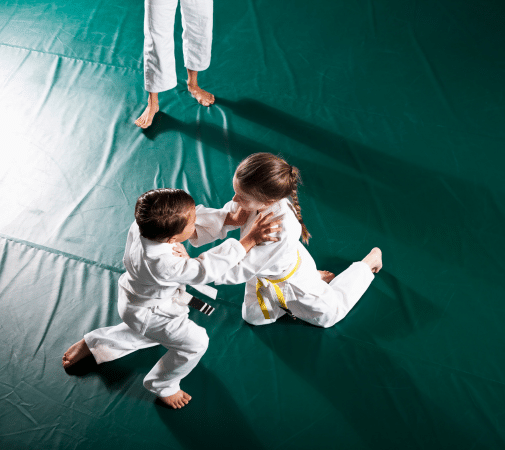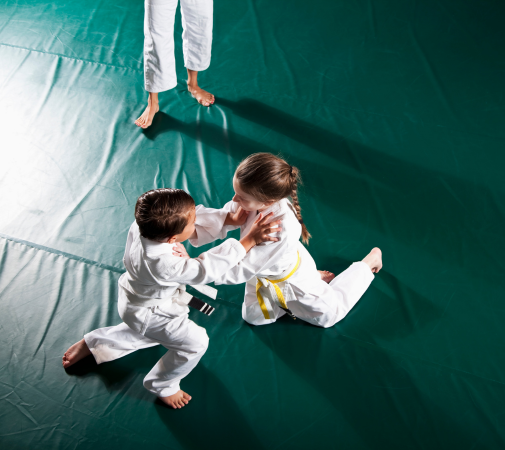

Jiu Jitsu for Kids: Building Confidence and Physical Fitness
Introduction
Jiu-Jitsu is a martial art that originated in Japan and has gained popularity worldwide as an effective fighting style and form of self-defense. It involves various grappling techniques, holds, and submissions to overcome an opponent. However, Jiu-Jitsu is not solely about physical combat; it also emphasizes mental discipline, respect, and personal growth.
Practicing Jiu Jitsu for kids offers numerous benefits. Firstly, it helps build confidence. As children learn new techniques and techniques to defend themselves, they become more self-assured and develop a sense of empowerment. Jiu-Jitsu also teaches resilience by emphasizing the importance of perseverance, overcoming challenges, and maintaining composure in difficult situations.
Moreover, Jiu-Jitsu promotes physical fitness by offering a rigorous workout. Kids engage in exercises that improve their strength, flexibility, and coordination. Through this martial art, children build strong bodies and develop healthy habits that contribute to their overall well-being.
Furthermore, Jiu-Jitsu fosters discipline and self-control. Kids learn to follow instructions, respect their instructors and training partners, and develop patience. These values translate into other aspects of their lives, such as academics and relationships.
In conclusion, Jiu-Jitsu offers a well-rounded martial arts experience for kids, focusing on confidence building and physical fitness. It not only equips them with self-defense skills but also instills important life lessons and values. Whether it is for personal growth, self-discipline, or physical health, practicing Jiu-Jitsu can be highly beneficial for children.

The Basics of Jiu-Jitsu for Kids
Jiu-Jitsu, a martial art originating from Japan, is known for its principles of respect, discipline, and perseverance. When practiced by kids, Jiu-Jitsu not only nurtures physical fitness, but also instills important life skills.
One of the fundamental aspects of Jiu-Jitsu for kids is its focus on respect. Children are taught to respect themselves, their peers, their instructors, and even their opponents. Through this, they develop better self-control and empathy, fostering a positive and harmonious environment.
Discipline is also emphasized in Jiu-Jitsu for kids. Learning the techniques requires patience, focus, and consistent effort. By following the structured training routines and respecting rules, children understand the importance of perseverance and dedication in achieving their goals.
When it comes to techniques, Jiu-Jitsu for kids emphasizes age-appropriate moves that prioritize safety. The emphasis lies on leverage, body positioning, and joint locks rather than strikes. This enables children to develop basic self-defense skills and improve their overall coordination, balance, and motor skills.
Safety measures are of utmost importance in Jiu-Jitsu for kids. Instructors ensure that children are trained in a safe and controlled environment, using proper protective gear. Techniques are taught gradually and in a progressive manner, allowing kids to build their skills gradually over time.
In conclusion, Jiu-Jitsu for kids offers numerous benefits. By fostering respect, discipline, and perseverance, kids not only gain physical strength and self-defense skills, but also develop important character traits that will positively impact their lives outside the dojo.
Building Confidence through Jiu-Jitsu
Jiu-Jitsu, a martial art and lifestyle, has proven to be a powerful tool in developing self-esteem and courage. Through its unique techniques and philosophies, it empowers individuals to overcome their fears and build confidence in themselves.
Many stories of transformation have emerged, particularly among kids who have found their confidence through Jiu-Jitsu. These young practitioners initially struggled with low self-esteem and were plagued by self-doubt. However, through their training and dedication, they experienced a remarkable shift in their mindset. Jiu-Jitsu taught them to embrace challenges, pushing them beyond their comfort zones. As they achieved small victories on the mat, their self-esteem grew exponentially.
One of the main ingredients in building confidence through Jiu-Jitsu is the encouragement of a positive mindset. Students are taught not to fear failure but to view it as an opportunity for growth. In Jiu-Jitsu, mistakes are seen as stepping stones on the path to success. This mindset shift allows individuals to face their fears head-on, knowing that even if they fail, they will learn valuable lessons along the way.
Fear of failure is a common obstacle that holds many people back from reaching their full potential. However, Jiu-Jitsu provides a safe and controlled environment where individuals can face their fears and overcome them. By experiencing success in a controlled setting, individuals slowly build the courage to face challenges beyond the mat.
In conclusion, Jiu-Jitsu plays a pivotal role in developing self-esteem and courage. Through empowering stories of transformation and encouraging a positive mindset, individuals are able to overcome their fear of failure and build the unwavering confidence needed to excel in life.
Enhancing Physical Fitness with Jiu-Jitsu
Jiu-Jitsu is a martial art that offers numerous physical benefits for children. It helps improve their strength, flexibility, and coordination, making it an ideal activity for enhancing physical fitness.
Childhood development greatly benefits from regular physical activity. Engaging in activities like Jiu-Jitsu allows children to improve their overall physical health and well-being. The various techniques and movements involved in Jiu-Jitsu help develop and strengthen different muscle groups, leading to increased strength. Moreover, the grappling and rolling involved in this martial art improves flexibility and joint mobility, leading to better overall body flexibility.
Coordination is another key aspect that is developed through Jiu-Jitsu. The art requires precise movements, balance, and body awareness to execute techniques effectively. Regular practice of Jiu-Jitsu helps children improve their coordination, leading to improved motor skills and spatial awareness.
In addition to these physical benefits, Jiu-Jitsu also promotes a healthy lifestyle and combats childhood obesity. By participating in this martial art, children are encouraged to engage in regular physical activity and maintain a balanced diet. This helps prevent sedentary behaviors and fosters a love for an active lifestyle from an early age.
Jiu-Jitsu offers an array of physical benefits for children, including improved strength, flexibility, and coordination. Engaging in this martial art not only aids in childhood development but also promotes a healthy lifestyle and helps combat childhood obesity. Encouraging children to participate in Jiu-Jitsu can contribute to their overall physical fitness and well-being.
Jiu-Jitsu as a Tool for Social Skills Development
Jiu-Jitsu, often referred to as the “gentle art,” is not just a martial art but also a powerful tool for developing essential social skills. Participating in Jiu-Jitsu classes can greatly enhance an individual’s ability to make friends and work effectively as part of a team.
Jiu-Jitsu classes are typically conducted in a supportive and collaborative environment, where students are encouraged to interact and learn from each other. This fosters a sense of camaraderie among students, allowing them to bond and form lasting friendships. Through partner drills and sparring sessions, practitioners learn to trust and rely on one another, building a strong sense of teamwork. This ability to work together as a team extends beyond the dojo and can have a positive impact on social interactions in various aspects of life, including school, work, and personal relationships.
Respect is a fundamental aspect of Jiu-Jitsu training, both towards one’s peers and instructors. Students learn to treat their training partners with dignity and respect, regardless of their skill level or background. This emphasis on respect cultivates a positive and supportive atmosphere where everyone feels valued and accepted. These respectful behaviors can then be transferred outside the dojo, promoting better relationships and interactions in the wider social sphere.
One of the most notable impacts of Jiu-Jitsu on social behavior is the development of self-discipline and self-control. Practitioners learn to regulate their emotions and reactions during intense training sessions, which translates into better self-management in everyday life. This improved self-control can positively influence social interactions by reducing impulsive reactions and promoting more thoughtful and considerate behavior.
Jiu-Jitsu not only provides physical benefits but also serves as a valuable tool for developing social skills. Through the emphasis on teamwork, respect, and self-control, practitioners gain the ability to make friends, work effectively in groups, and navigate social situations with greater ease and grace.
Choosing the Right Jiu-Jitsu Program for Your Child
Choosing the right Jiu-Jitsu program for your child is essential to ensure their safety, enjoyment, and progression in the sport. Here are some factors to consider when looking for a kids’ Jiu-Jitsu class.
Firstly, pay attention to the instructor’s qualifications and experience. The instructor should have a solid background in Jiu-Jitsu and preferably experience teaching children. It’s important that they can effectively communicate and demonstrate techniques in a way that children can understand and benefit from.
Next, observe the class environment. The atmosphere should be positive, encouraging, and focused on creating a safe space for kids to learn and grow. Look for a program that prioritizes discipline, respect, and teamwork.
Ask questions before enrolling your child to ensure you have all the necessary information. Inquire about class sizes, the age range of students, and the frequency and duration of the classes. It’s crucial that the program aligns with your child’s schedule and age group.
Supporting your child’s Jiu-Jitsu journey is vital for their progress and enjoyment. Encourage them to practice outside of class, whether it’s through reviewing techniques or engaging in light sparring with a family member. Stay involved in their training by attending competitions, cheering them on, and celebrating their achievements.
Finding the right Jiu-Jitsu program for your child requires careful consideration of the instructor’s qualifications, class environment, and schedule compatibility. Support your child’s journey by staying engaged and encouraging them to practice outside of class.
Conclusion
Jiu-Jitsu offers numerous benefits for children, such as boosting their confidence and improving their physical fitness. By participating in this martial art, kids learn essential life skills and values that can benefit them in various aspects of their lives.
Throughout this article, we have highlighted the key points on why Jiu-Jitsu is an excellent choice for children. Not only does it teach them self-defense techniques, but it also instills discipline, focus, and perseverance. These qualities are vital for a child’s overall development and success in other areas, such as academics or extracurricular activities.
Parents should consider martial arts, specifically Jiu-Jitsu, as a holistic approach to their child’s development. Not only does it provide physical exercise and improve coordination, but it also enhances mental strength and character. The confidence gained from mastering Jiu-Jitsu techniques can make a significant difference in a child’s self-esteem and ability to face challenges.
Furthermore, the lifelong skills and values that Jiu-Jitsu teaches extend far beyond the training mats. Respect, humility, and resilience are just a few of the qualities that will benefit children throughout their lives. By enrolling their kids in Jiu-Jitsu classes, parents are offering them an opportunity to cultivate these important qualities, setting them up for success in their future endeavors.
Jiu-Jitsu is a martial art that offers a wide range of benefits for children, both physically and mentally. It is an excellent way to instill discipline, boost confidence, and develop important life skills and values. Parents who consider Jiu-Jitsu as part of their child’s development are giving them a valuable tool for lifelong success.
Advertisements
Granite Bay Jiu Jitsu
RELATED POSTS










